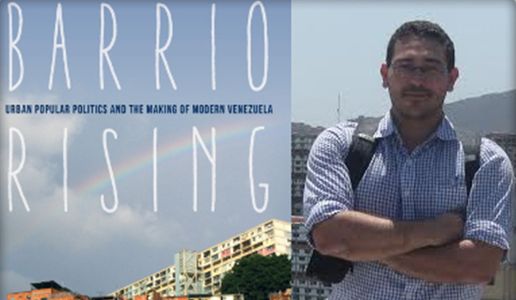LAS Event Traces Rise of the Barrio
At a recent event organized by the Latin American Studies Program, attendees learned about the rise of the barrio, or low-income neighborhood, as a unit of cultural and political power in Venezuela.
“Barrio Rising” was both the name of the Oct. 20 event, held at the Frederick S. Pardee School of Global Studies at Boston University, and a book by Alejandro Velasco who gave the talk. “Barrio Rising: Urban Popular Politics and the Making of Modern Venezuela” was published by the University of California Press.
Velasco, an Assistant Professor at New York University’s Gallatin School of Individualized Study, said that while barrio is a term widely used to denote urban poverty, it has a more specific context in Caracas, the capital of Venezuela.
“The barrio in Caracas was a hotbed throughout the 1960s and 1970s for third-part activism and protest,” Velasco said. “The barrio brought together multiple generations of Venezuelans’ radical tactics to organize activism around acquiring basic needs.”
Based on years of archival and ethnographic research in Venezuela’s largest public housing community, Barrio Rising delivers the first in-depth history of urban popular politics before the Bolivarian Revolution, providing crucial context for understanding the democracy that emerged during the presidency of Hugo Chávez.
Velasco is a historian of modern Latin America whose research and teaching interests are in the areas of social movements, urban culture and democratization. Velasco has also taught at Hampshire College and Duke University. His research has won major funding support from the Social Science Research Council, the American Historical Association, the Ford Foundation, and the Mellon Foundation, among others, and he has presented widely at both national and international conferences and symposia.
The Latin American Studies Program is an affiliated regional studies center of the Pardee School of Global Studies.
